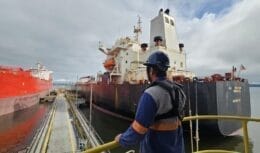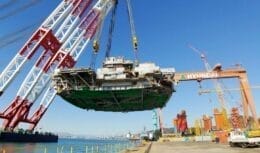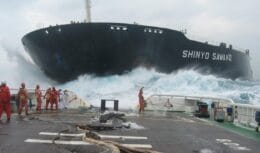
Faced with the complex web of challenges presented by the theft of fuel from vessels in the Amazon, coordinated actions, engagement between sectors and effective legislative measures emerge as essential pieces to reverse this alarming situation and ensure the integrity of logistical operations and the safety of communities that depend on these vital resources.
The Amazon region has been the scene of a series of fuel thefts, with around 4 million liters diverted from vessels in the last 18 months. Organized criminal groups have operated to loot these essential products, vital both for supplying cities and for generating electricity in areas disconnected from the national grid. This alarming information was revealed through a study carried out by the Legal Combustível Institute (ICL) in conjunction with the Brazilian Institute of Petroleum and Gas (IBP). Both institutions are mobilized to repress this criminal activity and defend the implementation of coordinated actions by the security forces in order to effectively combat crimes in the region.
Vessels in the Amazon Region suffer from theft of 4 million liters of fuel in 18 months
With its impressive 6.571 kilometers in length, the Amazon River is a crucial waterway, considered a natural route for the transport of various products.
Annually, approximately 11 billion liters of fuel are traded in this area.
However, freight transport in the region faces significant challenges due to poor security.
Valéria Lima, Downstream Executive Director at IBP, highlights the complexity of the safety issue on the Amazon River, which encompasses not only fuel transport, but also affects passenger vessels.
She explains that fuels are frequent targets for organized crime due to their application in different sectors, such as aviation and illegal mining.
However, he emphasizes that it is crucial to understand the impact of this on society in general, noting that cargo theft is a concern that goes beyond oil products.
In response to this critical scenario, the ICL and IBP institutes are proposing a series of initiatives to curb criminal practice.
Among the proposed strategies, the integration of intelligence data between the competent authorities and the supervisory bodies stands out.
In addition, the creation of task forces specialized in combating crimes in the region is seen as an essential measure.
Along with implementing stricter laws and strengthening enforcement force resources.
Recently, these entities promoted an event in Brasilia to discuss these measures and raise awareness of the urgency of the problem.
The IBP board emphasizes the importance of collaboration between the productive sector and the national security forces.
According to them, security is a shared responsibility and all sectors must come together to face this growing challenge.
Legal Combustível Institute and Brazilian Institute of Oil and Gas join forces to fight crimes in the Amazon and propose security measures
Amidst the wait for the implementation of structural measures to contain the problem, transport companies have resorted to private security services to protect river convoys.
O ICL and the IBP developed an orientation manual to help companies that choose to hire armed escorts.
Carlo Faccio, director of ICL, points out that these actions have already contributed to reducing the number of occurrences.
Until July of this year, there were nine robbery attempts, with three cases effectively consummated, and one of them resulted in the recovery of the load shortly after the theft.
In the previous year, the same nine attempts were registered, but seven thefts were carried out.
However, private security also generates additional costs for companies and increases the risk of violent confrontations during robberies, including possible shootings and fuel spills in rivers.
The president of the ICL, Emerson Kapaz, warns that the entities have been communicating with the authorities for months about the seriousness of fuel diversions.
He points out that this issue has been the subject of several meetings with representatives of the federal government, with a view to establishing commitments between the sector and the authorities to build partnerships in order to combat this practice.
Kapaz also emphasizes the importance of the National Congress in facing this problem.
He mentions the processing of a bill dated 2017, which aims to define the crimes of theft, theft and reception of products from production units, storage facilities and pipelines, while increasing penalties.
The intention is to expand the scope of the project to include additional modes of transport, including waterway.













Army summons Brazilians with up to…
Come be a watermelon, you too
Air Force F-16 fighters…
Everything is fine, 100-year secrecy,…
Air Force F-16 fighters…
Well... It's flying scrap... Typical...
Air Force F-16 fighters…
Which genocide are you talking about? Than…
Brazil begins an ambitious journey…
Very poor project with the final station…
Is it because we are Brazilians???
Brazilian governments must learn to…
I buy it for sure!
This makes me laugh, at 42kg you don’t…
There is no wind, no rain or…
Errata, it is not a helium isotope and…
Simple Jorge, fusion uses helium…
Luis is not fission, he is fusion, and…